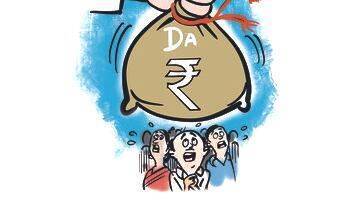

THIRUVANANTHAPURAM: Kerala’s Finance Department has issued two orders pertaining to the payment of Dearness Allowance (DA), aiming to address a growing gap between the state’s revenue and expenditure. The orders, sanctioned by the department, appear designed to meet the expectations of the Finance Commission, which is scheduled to visit the state next month for a revenue deficit grant review.
The grant is a critical component for states to manage revenue shortfalls and address liabilities incurred through increased expenses such as DA and salary revisions. Last year, Kerala received ₹53,137 crore as part of this grant and officials hope for a comparable allocation this time.
After Kerala’s pay revision in 2021, the DA was increased by 24%, necessitating at least ₹17,000 crore. This year, DA was paid in two increments: 2% in April and 3% in October, but 19% in arrears remains. Had DA been granted fully retroactively from January and July 2021, the state would need ₹8,200 crore to cover 39 months’ worth of arrears. However, limiting DA payments to the current fiscal year reduces expenditure to ₹2,000 crore.
Kerala’s Finance Department has structured DA payments to create a favourable perception with the Finance Commission. By avoiding explicit retroactive arrears in this year’s DA orders, the state intends to demonstrate a more controlled expenditure profile, potentially strengthening its case for the revenue deficit grant.
The state’s liability from the 2021 salary revision alone stands at around ₹25,000 crore annually, amounting to ₹1.25 lakh crore over five years. This increase in revenue expenditure, coupled with the state's limited revenue growth, has heightened Kerala's dependency on central grants to bridge the deficit.
The Finance Commission’s revenue deficit grant considers factors like current fiscal year expenses, forecasted expenses over the next five years and factors impacting income, such as a stagnant manufacturing sector and economic challenges. Natural calamity-related costs also strengthen the case for additional central aid. Kerala received the highest grant in the previous review, in part due to the state’s accumulated liabilities, including a ₹15,000 crore shortfall from the last salary revision.
State employees are concerned that granting DA without retroactive effect could mean a permanent loss of arrears, which amounts to 19% over six installments. Although DA is considered a benefit rather than part of the base salary, limiting legal recourse, employees are apprehensive about the impact on their dues.